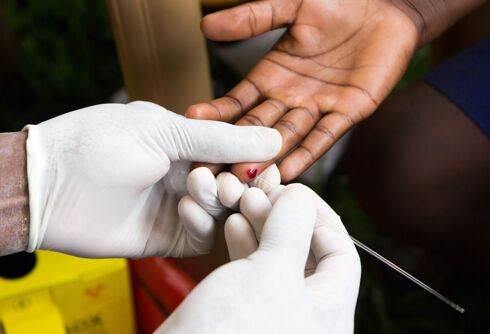The lively wall art at Garima Greh greets me as I enter and speaks of values like equality, respect, and opportunity. The residents are going about their everyday affairs. On the left, there is graffiti that reads “Love yourself,” and the colorful curtains enhance the scene.
Garima Greh, also known as the House of Pride, was founded in April 2021 in order to provide transgender people in New Delhi with access to basic necessities like accommodation, food, healthcare, and recreational activities. More than 25 trans people call it home; it is funded and sponsored by the Ministry of Social Justice and the Mitr Trust. Additionally, it promotes skill development for transgender people.
Related:
India’s drag scene is nothing like America’s. Here’s how it’s different & why
While drag as Americans know it may have only existed for a decade in India, the history of gender subversion goes way back and the audience may be as important as the performers.
Priyanka, a 31-year-old Assamese transgender woman, is engrossed in her work as she sorts through flowers she has gathered from surrounding temples while sitting in a nook of the Garima Greh past the graffiti.

In India, transgender people have long had difficulty finding mainstream work and healthcare. Because of discrimination, employment opportunities are limited by unpredictable income. In order to collect money for gender-affirming health care, she makes potpourri out of discarded flowers. She faced harassment as a result of the sex she was assigned at birth, and she had gender dysphoria since she was a little child.
Never Miss a Beat
Subscribe to our newsletter to stay ahead of the latest LGBTQ+ political news and insights.
She talked about how violence was ignored in India’s early years, forcing young transgender people to leave school.
“Since I was a little kid, I’ve had gender identification issues. I didn’t want to go to school because I was being bullied and treated badly,” she said. “My family was informed of this. They repeatedly promised to look into the situation, but they never did. Therefore I quit school in the interim.”
When Priyanka came to terms with her identity, the idea of receiving gender-affirming care with family support was unimaginable because her father, a priest, barely made $60.65 U.S. per month. She describes the helplessness and thinks back to her father, who passed away two years ago.
“When I told my father about it, he was a little skeptical. He quickly gave me an embrace to show that he didn’t care what gender I was. He might still persuade me to switch to a different sex, though. That would also be very expensive. He suggested that I work for myself and save money for the transition,” said Priyanka.

Top and bottom surgery in India might cost anywhere from $2,426 U.S. to $18,195 U.S. For transgender people like Priyanka, financing gender-affirming care is practically impossible without a steady source of income.
India may be considered progressive in that it recognizes principles that are inclusive of the LGBTQ+ population with the repeal of the harsh Section 377, which criminalized same-sex relationships.
However, harassment occurs frequently in both physical and online settings. A 22-year-old non-binary transgender person from Pune who had started fundraising on Ketto (a crowdfunding platform in India) in June last year in hopes of raising money for their gender-affirming care was attacked and bullied online. They were depressed and anxious, suffering from suicidal thoughts.
Priyanka, who hails from Assam in the northeast, moved to New Delhi last year and settled in Garima Greh. Along with her fellow residents, she was given access to recreational opportunities, food, and healthcare, and she learned the interpersonal skills necessary for building a business.
A group of college students visited the shelter home five months ago to educate the residents about potpourri. Priyanka was intrigued by this lesson because, despite her love of business, she didn’t have a good, original idea. But she knew that it would be a business with low startup costs, significant returns, and a social good.
“I was amazed at the idea of making potpourri out of discarded flowers, but the most significant benefit is that it helps to protect the environment.” Priyanka describes how it all started, “So I decided to make it to save money for the transition operation and pay for essentials like food and medicine.”

The Indian government enacted the Transgender Persons (Protection of Rights) Rules in 2020, which said that transgender people were entitled to free gender-affirming care at state-run clinics. Priyanka has a transgender identification card issued by the Indian government. She decided against using government programs instead of doing anything on her own. Since learning about the procedure, she has been working to save enough money for surgery. It is difficult for her to obtain the large sum due to her unsupportive family and lack of a steady source of income.
“Few transgender people are welcomed by their families today,” she said. “What about those who aren’t, though? Like me, my family is not close enough for me to ask for help with survival or basic requirements. I don’t have a lot of education, so I can work somewhere.”
According to the transgender persons (Protection of Rights) Bill 2016, discrimination against a transgender person is illegal. This includes unfair treatment or denial of service in the areas of work, education, healthcare, and access to public services and facilities, among other areas. Although the Transgender Bill has specific provisions that protect transgender people’s interests by outlawing discrimination in employment, putting those rules into practice is a difficult task.

According to a 2018 survey by the National Human Rights Commission (NHRC), 96% of transgender people are denied employment and are forced to engage in low-wage or undignified labor for a living, such as sex work and begging. The first-ever study on the rights of transgender people also revealed that about 92% of transgender people are deprived of the right to participate in any form of economic activity in the country, and even qualified trans workers are refused jobs. Over 89% of transgender respondents said there are no jobs for even those who are qualified.
According to the report, between 50% and 60% never went to school, and those who did experienced severe discrimination. The NHRC also reported many of them gave up their education due to harassment from students (52%) and teachers (15%). Before then, just 6% of transgender people worked in the commercial sector or for NGOs, and only 1% of transgender people reported having a monthly income of over $304.02 U.S.
In the past, but only privately, the shelter’s residents produced potpourri. Priyanka requested Bella, the project manager at the time and the first occupant of the shelter house, help the growing business more formally, establishing their own company called “BOLD Potpourri.”

The inhabitants were able to pay for their necessary medical expenses, such as hormones, with help from the group effort. The residents’ goal of funding gender-affirming surgery, though, is far off in the future.
Priyanka completes their products with high expectations for the upcoming show, which is scheduled for the following week. She envisions the program developing into a larger undertaking that will allow her and the other residents to lead the lives they have always wanted as she stands in front of the colorful draperies.

”We want to stand on our own two feet first to live our identity. We need more stability and funds to finance our change,” said Priyanka. “Individuals buy our products because they feel sorry for us transsexual people. But I do hope that people will help us brand our project as BOLD, which we are.”
Don't forget to share:
















